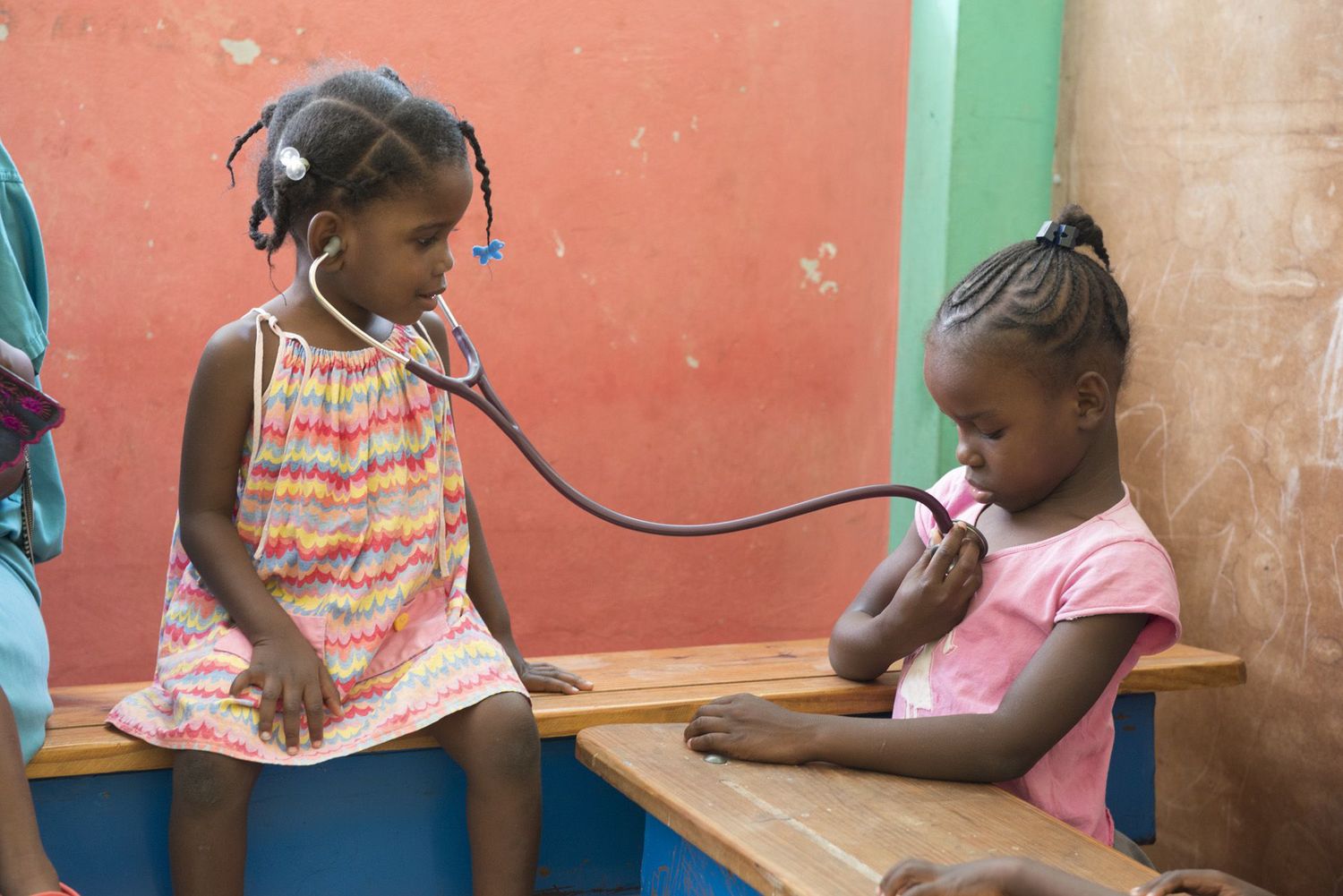aiti day 5 April Day 4
Really interesting day. Another morning in the clinic with more nursing students with multiple small complaints. We did get to see a couple of men today which was a welcomed change. One was an Ethiopian gentleman who worked for the UN and is now retired. He has lived in France but has decided to retire in Haiti. I asked him how he liked the country and he had only positive things to say. I think he is probably able to live cheaply in a big house and is apparently used to third world style living. Most of the students packed lots of packages of medications in anticipation of tomorrow. We then left the hospital and walked back to Gladys's house. The sun today was incredibly strong, the dust was not quite as bad due to a really heavy storm the other night. More concrete being poured on the street. We finished packing our suitcases and waited in the mid day humid sun as we watched the interpreters perform the impossible. They loaded about 10 heavy suitcases full of medications plus all of our individual bags in the back of the bus, then on top of our bus, while it was at a pretty sharp angle leaning into the street, then finally making room for 18 of us to then sit. I think we were all a little worried about being a next day news story.
The bus drove us to a local supermarket where we loaded up on local wine and coffee, then off to the mountains! The translators chose to sit in the back and were cracking up the whole time. I think they were laughing at the bus driver who was cantankerous and complaining about the situation the whole time, which admittedly was not easy. We then drove through down town Port Au prince. Oh god, now I realize that we were staying in the nice part of town. We had a trickle of water pressure, no air conditioning and limited bathroom space, our conditions would probably feel like we were slumming it to most people of our Philly local suburbs. Trust me, we were in luxury at the house. It wasn't so much that the people were living in shacks, but in tarp covered boarded up shanty town that looked like they had been there for years. The most disturbing thing is the amount of trash everywhere.Piles and piles of trash. Susan mentions excitedly that there is so much less trash in PAP. What?! 70% unemployment in the country. Everyone seemed to be sitting on the side of the street selling stuff that consisted of either clothes and shoes, water and coke bottles that would become more trash or mangos. I don't think pictures would really explain it, we have all seen the pictures of the streets in third world countries, but driving through it you understand. Haiti is particular frustrating because you can see the potential for something so much better. The land scape is beautiful, the people are lovely, its heartbreaking that its all due to bad politics, much of which has to do with the US that its so impoverished. To go only a few miles took over an hour. The traffic is terrible. We saw UN trucks drive by full of armed, dressed solders. Joel tells us that “they do nothing but add to the traffic”. Many tam tams which are local pick up trucks painted with religious quotes colorfully painted with benches built into the back where about 8 people sit for 25cents per ride. Finally made it through the city and started winding high into the mountains. The road was paved for the first several miles which was new since last year Susan tells us. Then the road is unpaved and winding. The translators again are cracking up perhaps nervously this time at the travails of us, the driver and what could potentially be not very funny. The bus turns a corner and suddenly the mountains open up. The cinderblock shacks are out of view and the ocean appears. Everyone sighs “oh... wow”. More cinderblock, some carefully painted graves, children, adults staring out on the road. More are smiling now, fewer are selling things. Some waves. Then farms! Not a lot, but some. And they are beautiful. Wish I saw more. From what I have read so far most of haiti used to be rural but due to politics and the US selling haiti subsidized cheap food from the US most of the farmers moved from the mountains to the city and the farmer went out of business. We kept going up and up until we were literally at the top of the mountain, and now found Gladys's mountain home. She and her friend were here and a helper was cooking dinner. The bus drivers was totally pissed now after miles of dirt mountain road and a huge heavy bus and now he has to drive the suit bags full of medications to the church. We all took in the view from the house. The back balcony looks over the mountain and to the ocean. Its a bit hazy so the whole this was not fully visible but I cant wait till the morning. Its chilly which is sooo refreshing and we all threw on jackets and climbed to the roof. We are on top of haiti. The unspoiled, naturally at peace haiti. Fantastic. Back to business, Phillip on of the students gave a talk on intestinal worms which was excellent before dinner. We had dinner, some Chilean box wine that Gladys brought out. We are doubling up on beds and cots its really fun, Lynda opened up her Haitian rum and we all took sips from cups. Its excellent. I don’t think anyone drinks in haiti except the tourists. Well more rum for us I guess. Good night!
